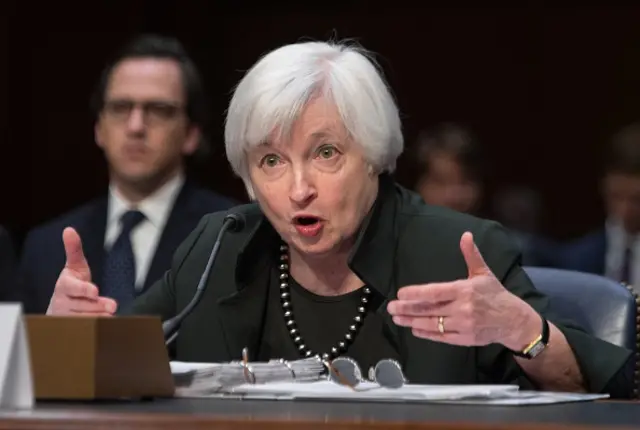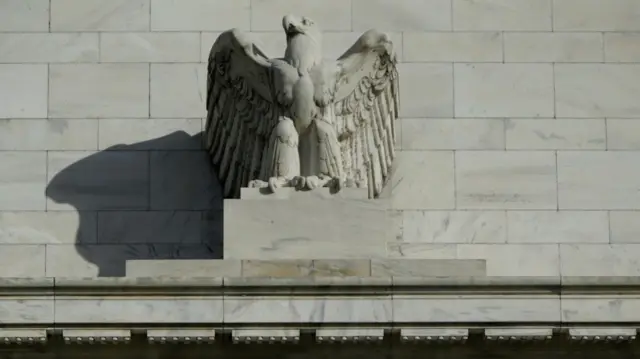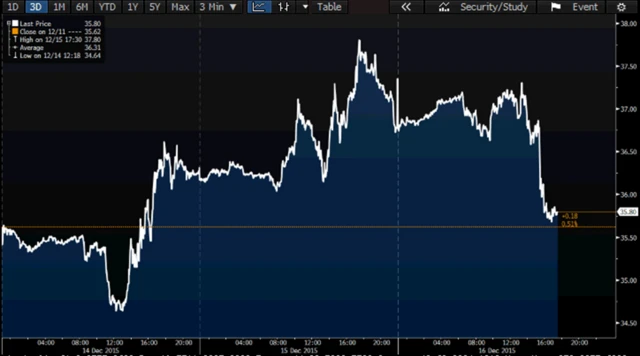Yellen news conference to start shortlypublished at 19:26
 Image source, GEt
Image source, GEtJanet Yellen will start her news conference shortly. It will be closely watched for any indication of the pace of future rate increases.
The US Federal Reserve raises interest rates by 0.25%
Fed expects future rate increases to be 'gradual'
US shares rise after rate decision
UK unemployment falls to the lowest in nearly 10 years
Dixons Carphone shares rise on results and a hike in the dividend
Russell Hotten
 Image source, GEt
Image source, GEtJanet Yellen will start her news conference shortly. It will be closely watched for any indication of the pace of future rate increases.
Quote MessageThe Federal Reserve’s decision to raise interest rates primarily reflects the health of the US jobs market, so the strengthening of US household incomes is good news for British firms selling into the US market. The move was widely anticipated and the consequences for the UK are likely to be small. Alongside the US, the UK has been one of the best performing advanced economies in recent years, but the Bank of England probably still has a way to go before rising inflationary pressures at home persuade it to follow and up interest rates.”
Rain Newton-Smith, Director of Economics, CBI
Former member of Britain's rate-setting Monetary Policy Committee Marian Bell tells the BBC that the rise "was a long time coming, and is to be welcomed".
She says: "It's almost been taboo to talk about rate rises, but the genie is now out of the bottle. It gets the message out that we have been on emergency settings for years, and that people can no longer arrange their finances on the current low interest rates."
Interesting aside from the BBC's Adam Parsons.
Economists are highlighting that the Fed said it expects "gradual" adjustments to interest rates.
You can find the Fed's statement, external here.
Quote MessageThe Committee expects that economic conditions will evolve in a manner that will warrant only gradual increases in the federal funds rate
Fed Statement
From the BBC's business editor
 Image source, GE
Image source, GEWe have lift off!
As expected policymakers at the US Federal Reserve have raised interest rates by 0.25% to between 0.25% and 0.5%.
It's a big moment as interest rates have been near zero since December 2008 and the last interest rate rise was in June 2006.
The last cycle of interest rate increases began in June 2004.
You can find all the figures on the New York Fed's website, external.
US shares have been rising ahead of the Fed's announcement. A short while ago the Dow Industrials was 0.4% higher at 17,594.
The dollar was 0.26% lower against the dollar, with $1 buying 0.9124.
The BBC's South America business correspondent tweets:
BBC Industry Correspondent John Moylan tweets:
Business Insider picks up, external on a research note from BNP Paribas.
BNP sees three scenarios developing after the Fed's expected rise in interest rates.
BNP Paribas thinks there's only a 30% chance of the first, happy, option.
Wake Up To Money presenter Adam Parsons tweets:
 Image source, AFP
Image source, AFPArgentina says it will eliminate foreign exchange restrictions at 21:00 GMT (18:00 local).
The official rate for the peso is 10 to the dollar, but a dollar buys almost 15 pesos on the black market.
It's the latest reform from new President Mauricio Macri - on Monday he announced a reduction, and in some cases the end of, taxes on agricultural and industrial exports.
The new government is hoping to boost the economy and to gain some investor confidence.
 Image source, Bloomberg
Image source, BloombergOil prices are falling again. The benchmark US measure, West Texas Intermediate is down $1.55 to $35.80 a barrel.
Brent Crude was down $1.18 to $37.27 a barrel.
Oil was holding on to Tuesday's gains until a report from the US government's Energy Information Administration said stocks of crude rose by 4.8 million barrels for the week ending 11 December, which was much more than analysts were expecting.
Oil prices have fallen by 60% since June 2014, as demand has waned and producers have maintained their output.
The BBC's Michelle Fleury tweets from Washington.
 Image source, PA
Image source, PAIt's been a while since US interest rates rose - something expected to change later today. Here's some perspective.
The last time the US Fed hiked rates, to 5.25%, was 29 June, 2006, and:
1. David Beckham was captaining England in the World Cup
2. The first iPhone was still a year away from being released
3. Saddam Hussein was still alive
4. David Cameron was six months into his reign as Conservative Party leader
5. Facebook had yet to become a public forum
6. The Queen held her 80th birthday celebrations
Hat-tip to Eden Tree Investment for the list.
European stock markets crept higher, with traders reporting caution among investors ahead of an expected US interest rise later today.
In London, the benchmark FTSE 100 index added 0.72% while Frankfurt and Paris rose by 0.18% and 0.22% respectively. Wall Street's main markets were also slightly ahead about two hours after the opening bell.
Russia has suspended a free trade deal with Ukraine. The move is bound up with Ukraine's planned free trade pact with Europe, due to start on 1 January.
Russia says the Kiev-EU deal could lead to a flood of European imports across its own borders and damage the competitiveness of Russian exports to Ukraine.
Moscow's decision means an end to the preferential regime in customs, investment and services.
The BBC's Rob Young tweets:
 Image source, Getty Images
Image source, Getty ImagesDenmark once again tops Forbes' list of the Best Countries for Business, external, for the second year running. In fact, the "old world" of Europe comes out quite well, with two-thirds of countries in the top 25.
Forbes says Denmark ranks well for personal and monetary freedom, as well as its low corruption. New Zealand moves up one spot to No. 2 (it ranked No. 1 in 2012). Norway’s rank of No. 3 is up four spots and is an all-time high for the country. The UK is tenth.
The US slides four spots to No. 22, and is doing badly on rankings for red tape and "technological readiness". More than 150 new major regulations have been added since 2009 at a cost of $70bn, according to measures used in the rankings.
Bottom of the list of 144 nations is Chad, replacing Guinea which held that spot for three straight years. Libya, Haiti and Myanmar join these two in the bottom five.